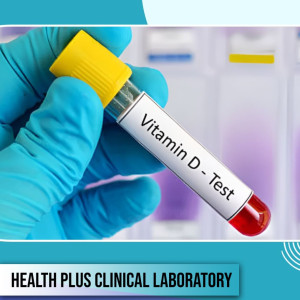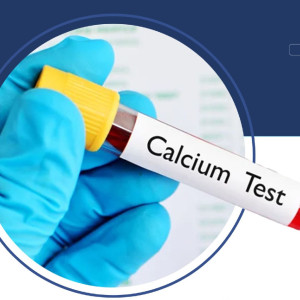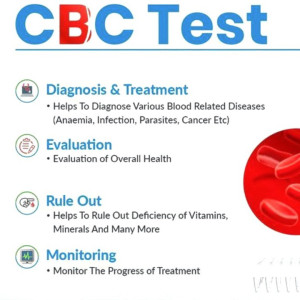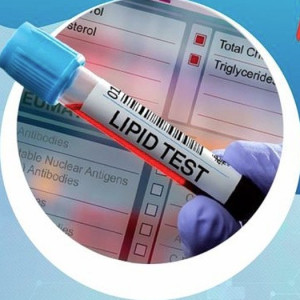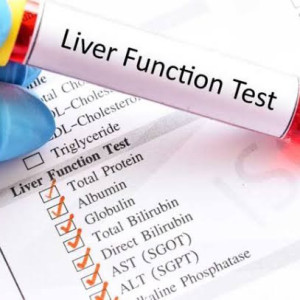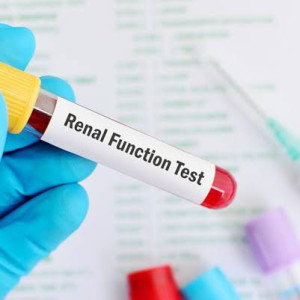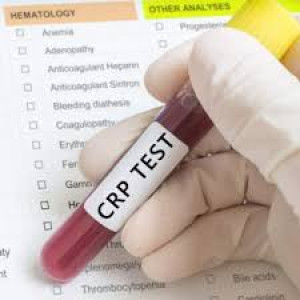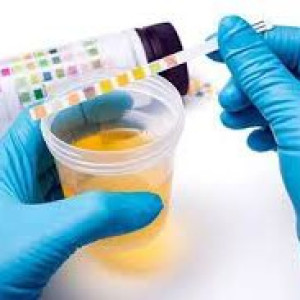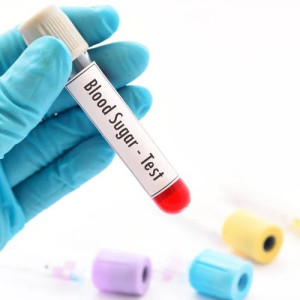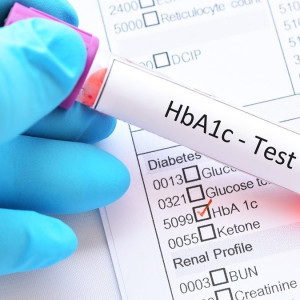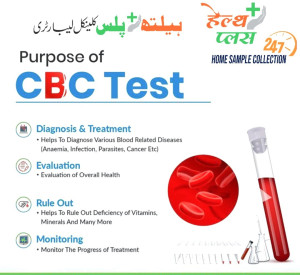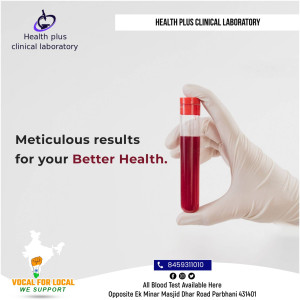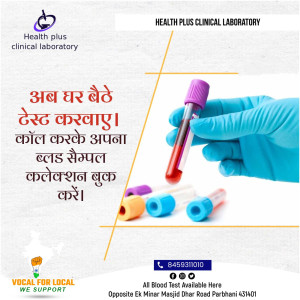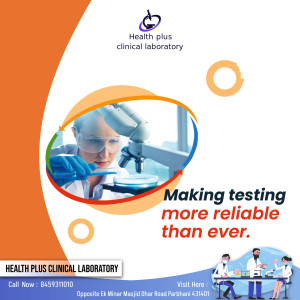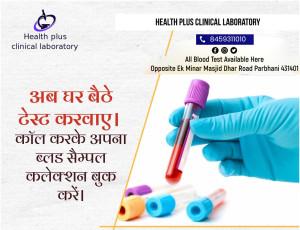About Us
| Company Name |
: Health plus clinical laboratory |
Accurate Results Health Plus Clinical Laboratory is dedicated to providing precise and reliable diagnostic services. Our team of experienced professionals utilizes state-of-the-art technology to ensure the highest accuracy in test results. This commitment to precision helps healthcare providers make informed decisions for patient care.
Advanced Technology
• Modern Equipment We use cutting-edge laboratory instruments to conduct a wide range of tests.
• Quality Control: Regular calibration and maintenance of equipment guarantee consistent performance
Skilled Professionals
• Experienced Staff: Our laboratory technicians
are highly trained and certified
Continuous Training: Staff members participate in ongoing education to stay updated with the latest advancements in laboratory sciences.
Timely Delivery
At Health Plus Clinical Laboratory, we understand that timely delivery of test results is crucial for effective patient management. We strive to provide prompt service without compromising on quality.
Efficient Processes
• Streamlined Workflow: Our laboratory processes are optimized for speed and accuracy.
• Automated Systems: Automation in sample processing reduces turnaround time significantly.
Commitment to Excellence
Health Plus Clinical Laboratory is committed to maintaining the highest standards in clinical diagnostics. By combining advanced technology with expert staff and efficient processes, we deliver accurate and timely results to support optimal patient care.
Services
Vitamin D
A vitamin D test measures the levels of vitamin D in your blood. Vitamin D helps your body absorb calcium to build healthy bones and teeth. It also helps keep your muscles, nerves, and immune system working normally. Having vitamin D deficiency (very low levels of vitamin D) can lead to bone disorders and other medical conditions.
Calcium Test
A calcium blood test measures the amount of calcium in your blood. Too much or too little calcium in your blood may be a sign of a wide range of medical conditions, such as bone disease, thyroid disease, parathyroid disorders, kidney disease, and other conditions.
THYROID TEST
Thyroid tests check to see if your thyroid gland works like it should. Your thyroid is a butterfly-shaped gland in your neck that sits just above your sternum (breastbone). It produces hormones that control several different body systems. It’s like a command center that manages how your body uses energy.
CBC TEST
A complete blood count (CBC) is a blood test. It's used to look at overall health and find a wide range of conditions, including anemia, infection and leukemia.
A complete blood count test measures the following:
Red blood cells, which carry oxygen
White blood cells, which fight infection
Hemoglobin, the oxygen-carrying protein in red blood cells
Hematocrit, the amount of red blood cells in the blood
Platelets, which help blood to clot
LIPID PROFILE
Lipids are fatty, wax-like substances found in the body. Your body needs lipids for proper body functions, growth, and energy. Two important types of lipids found in the blood are cholesterol and triglycerides. High levels of lipids in your blood may clog your arteries and increase your risk of heart disease and stroke.
LIVER FUNCTION TEST
Liver function tests (also called LFTs) are blood tests that provide information about how your liver is working.
If your liver function tests are abnormal, further testing might be necessary to work out what is causing liver damage and/or disease.
You should discuss the results of your LFT blood test with your doctor to see what they mean in your situation
Kidney Function Test
Kidneys play a critical role in eliminating metabolic body wastes and in maintaining the body's overall water and electrolyte balance. The kidney function tests (KFT) help you understand whether your kidneys are working efficiently or not by examining how effectively your kidneys are removing wastes from your body. A 24-hour urine sample, a blood test, or both may be required for kidney function evaluation.
C-Reactive Protein (CRP) Test
A c-reactive protein test measures the level of c-reactive protein (CRP) in a sample of your blood. CRP is a protein that your liver makes. Normally, you have low levels of c-reactive protein in your blood. Your liver releases more CRP into your bloodstream if you have inflammation in your body. High levels of CRP may mean you have a serious health condition that causes inflammation.
Urine Routine Test
A urinalysis is a set of tests that looks at the appearance of your pee (urine) and checks for blood cells, proteins and other substances in it. You provider might use it as a routine screening test or to look for signs of infection, kidney or liver disease, diabetes or other health conditions.
Blood Sugar Fasting & pp Test
This Glucose F/PP Test is a must in the clinical setting for a variety of reasons. It is typically used to test for prediabetes and diabetes by assessing the way that the body responds to glucose when having a fast or eating a certain quantity of carbs. The test plays an important role in regulating diabetes by observing blood glucose levels, specifically after meals, to evaluate the effectiveness of treatment. Additionally, it assists in the evaluation of metabolic conditions such as insulin resistance or hypoglycemia. It provides insight into the abnormalities in glucose metabolism. It helps in early detection, monitoring and management of these ailments the Glucose Test F/PP is a significant component of the complete health care of patients and management strategies.
HbA1C
HbA1C test is used to measure the average amount of blood sugar level over recent months. Your healthcare provider uses it to diagnose prediabetes and type 2 diabetes and to keep an eye on the progress one made during a diabetic treatment.
An HbA1C test is used to measure the glucose level in your blood over the past few months. The result is shown in percentage value. The higher your sugar level in your blood the higher the percentage of results, on average.
Vitamin B12 - Test
Since Vitamin B12 is a quintessential nutrient required in the healthy functioning and growth of the body, a lack of it is can lead to different types of anomalies especially one being folate deficient anemia. In most cases, cobalamin deficiency causes different types of anaemia and other neurodegenerative diseases. Being a B12 vitamin deficient may also make one prone to easy bruising or bleeding, cause blurred vision, fever, walking difficulties, gastrointestinal side effects including upset stomach, diarrhoea, irritable bowel syndrome, flatulence, constipation, Crohn’s disease, celiac disease, sore tongue, and weight loss. However, if the lack of this healthful nutrient is not corrected on time and left untreated, it can eventually lead to severe nerve and brain damage causing depression, disorientation and dementia and even temporary infertility in women.
Widal Test
The Widal Test detects Typhoid and Paratyphoid fever, often known as enteric fever, which is caused by consuming food or water contaminated with Salmonella bacteria. This is caused by Salmonella typhi and Salmonella paratyphi A, B, and C.
Typhoid fever is a potentially fatal fever-causing sickness caused by the intake of food or water contaminated with the feces of a person infected with Salmonella typhi. In the widal test for typhoid, an individual's blood reacts with the Salmonella antigens on the slide, forming agglutination (clumping).
There are two methods of performing the Widal test: the slide method and the tube method.

